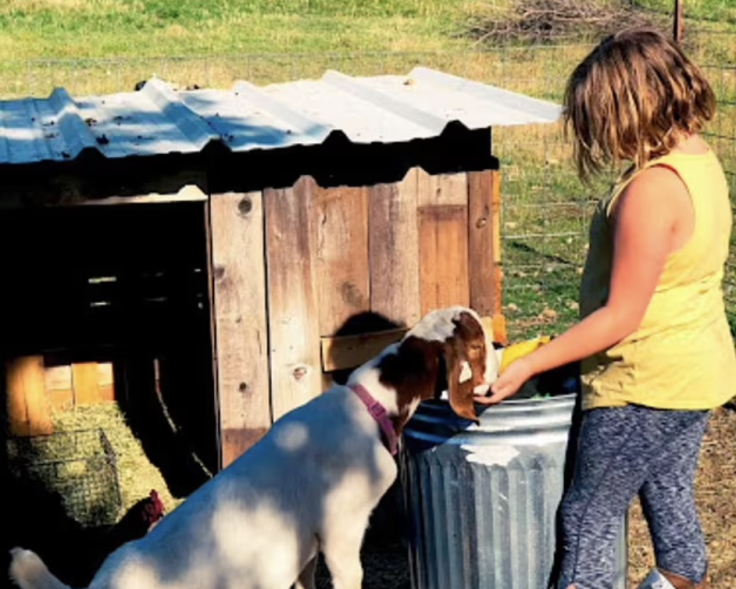
In a case that highlights the emotional and legal challenges associated with government involvement in pet ownership, a nine-year-old California girl has secured a $300,000 settlement after her pet goat, Cedar, was seized, killed, and barbecued by county officials. This disturbing incident, which concluded in court, has sparked questions about the extent of authority held by government agencies over personal property, especially when it comes to beloved pets.
The ordeal began in April 2022, when Jessica Long's daughter adopted Cedar, a young Boer goat, as part of a youth programme that encouraged children to learn about animal husbandry by raising livestock. Cedar quickly became a beloved companion, with Long's daughter caring for him daily. However, despite the bond that had formed, Cedar was initially entered into a junior livestock auction at the Shasta District Fair that June, where animals are commonly sold for meat. As the auction date approached, the family had a change of heart and decided they did not want Cedar to be sold.
Family's Fight to Save Cedar
When Jessica Long requested to remove Cedar from the auction, fair officials refused. According to DailyMail, in a desperate bid to save her daughter's cherished pet, Long reclaimed Cedar herself. However, this act led to drastic consequences. Shasta County officials, backed by a search warrant, travelled hundreds of miles to the Long family home, where they seized Cedar and transferred him to the fair. Cedar was then allegedly slaughtered and barbecued at a county event.
Shocked and devastated, the family pursued legal action against Shasta County, arguing that the county's actions were a serious overreach. "Unfortunately, this litigation cannot bring Cedar home," stated Vanessa Shakib, the family's attorney, "but the $300,000 settlement with the County of Shasta and Shasta County Sheriff's Office is the first step forward." Despite the monetary settlement, the family still lacks closure regarding the individuals responsible for Cedar's death.
Concealment and the Fight for Answers
During the court proceedings, text messages surfaced that indicated possible efforts to keep Cedar's fate hidden. B.J. Macfarlane, livestock manager at the Shasta Fair Association, sent a message to Chief Executive Melanie Silva stating, "Kathy said ok but no one needs to know about this," referring to the slaughter. In response, Silva reportedly added several laughing and embarrassed emojis, according to DailyMail.

The family's attorney noted that fair and county officials allegedly engaged in obstructionist tactics during the legal discovery process to avoid revealing the details of Cedar's death and the specific individuals involved.
Despite the settlement, Shasta County has not admitted fault. Christopher Pisano, the county's attorney, stated, "The County did nothing wrong, but we recognise the risk and cost involved in going to trial, and so we agreed to settle the case." For Long and her daughter, the case has highlighted the power disparity between citizens and government agencies when it comes to beloved animals.
Echoes of Government Overreach in Peanut the Squirrel's Case
Cedar the Goat's story reflects the broader issue of perceived government overreach in handling personal pets, which has become a flashpoint in recent weeks with the controversial euthanisation of Peanut the Squirrel. Peanut, a rescued pet squirrel with a large social media following, was seized by New York state authorities and euthanised under questionable circumstances. The incident has drawn the attention of high-profile figures, including billionaire Elon Musk and Congressman Nick Langworthy.
According to IBTimes, Musk criticised the incident on social media, stating, "It is NOT ok for the government to barge into your home and kill your pets! What has become of the Land of the Free?" Meanwhile, Congressman Langworthy has called the raid a gross overreach, demanding an explanation from New York authorities.
Both Peanut's and Cedar's stories have sparked national conversations around animal rights and the balance of government authority. Many people argue that these cases represent a disturbing trend in government intervention in pet ownership, with officials often ignoring the emotional significance of pets to their owners, particularly children.
A Growing Call for Reform
As Cedar the Goat's case concludes with a financial settlement, the Long family's fight for transparency and justice continues to resonate with those following Peanut's story. Both incidents underscore the need for reform and clearer boundaries when it comes to government intervention in pet ownership. The emotional impact on families, especially children, cannot be underestimated, and these high-profile cases have prompted calls for policies that respect the rights of pet owners while balancing public safety.
For now, the public's outcry over these incidents serves as a powerful reminder of the bond between humans and animals—and the responsibility of government agencies to handle such cases with care and compassion.







